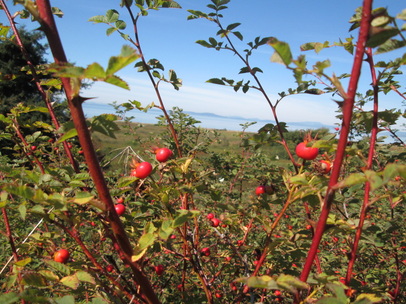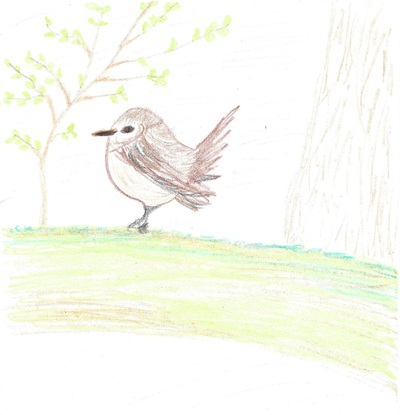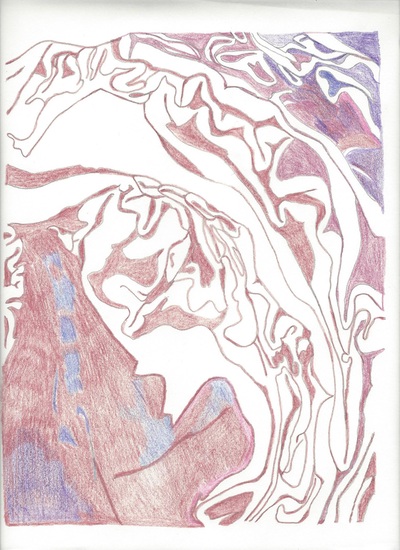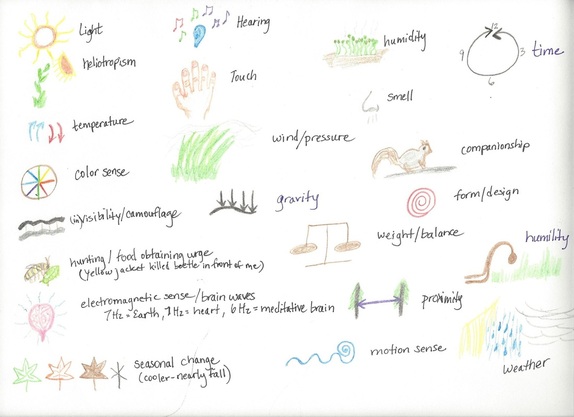What We Need Is Here
Geese appear high over us,
pass, and the sky closes. Abandon,
as in love or sleep, holds
them to their way, clear
in the ancient faith: what we need
is here. And we pray, not
for new earth or heaven, but to be
quiet in heart, and in eye,
clear. What we need is here.
Wendell Berry

The model of sensory awareness I study tells me there are 54 inherent biological senses humans have. When I first considered the list, I thought, "Are you kidding me?" I immediately agreed with the premise that 5 senses we are all taught in grade school (thanks to Aristotle) is outdated, but 54?
Then it occurred to me how many years people thought the Earth was flat as paper, so I thought it might benefit me to keep an open mind.
Several ecopsychology leaders use varying models to describe senses, but all seem to agree there are many categories of human senses. M. Amos Clifford of www.shinrin-yoku.org describes 8 categories as Body Sensing, Mirror Sensing, Intuition Sensing, Visual Sensing, Auditory, Olfactory, Touch, Taste.
Guy Murchie spent 17 years studying research literature to arrive at up to 80 inherent biological senses expressed among sentient beings, some of which are described in his book "The Seven Mysteries of Life".
It took me a year of working with a model of many senses to let go of my resistance to it and start using self evidence as my guide. So far I have worked through 25 senses and feel comfortable I "own" them. The most powerful exercise for me personally has been to go to a place that feels attractive to me in nature and sit for 10 minutes with the list of senses before me and see which ones make "sense" for me in that moment and place.
One sense I struggled to own is heliotropism or "sun sense" in plants that grow toward light. Then it dawned on me - what is epidemic in indoor civilization? Vitamin D deficiency! From lack of sun! Not only has low vitamin D level been linked to many disease states that plague modern society, but when I really listen to myself (after I down my vitamin D tablets with my coffee each morning), my body physically craves the sense of sun. In addition, imagine any human in a tunnel or a cave and I would make a safe bet we would all "go toward the light." Sunlight = Life on Earth at a very base level.
When "Mindfulness" is the buzz word of the day and even on the cover of Time magazine for its potential to create change in our psyche, it is the senses that I find actually anchor us to the fullness of the moment. Here is where ecopsychology comes in - the connection between our ecosystem and the way we think - to broaden our capacity for being mind-full. If we are spending close to 95% of our lives indoors, but our brains evolved to capacity for a wide range of senses available in natural environments, how disabled have we become in our ability to be mindful?
Over a year ago, I had an opportunity to talk to 50 middle school students about what ecopsychology was, and I asked them what they thought about the idea that humans have more than 5 senses. Almost immediately, most raised hands to mention a sense they could think of. Some talked about the sense of fear, the sense of itch as different than touch (which happens to be a recent finding in biomedical research), the sense when you know someone is looking at you, the sense you know someone is going to call you (intuition), the sense of thirst. So if this random sampling is any indication, young humans "know" we inherently have more than 5 senses.
For me, immersing myself in natural environments feels like solace and home. I can't wait to run toward my life by heading "outside." Part of the experience of Nature as home is because more of my inherent sensory brain is engaged, fully alive, activated. I also find myself buying art supplies for the first time EVER and wanting to make art, to somehow get inside the sensory connections I am making between me and the greatest artist in existence - Nature.
One of my biggest sources of tension has been the fact I earn a living that completely saturates to the point of impairment four key senses - sight, hearing, touch (repetitive motion), and language. These are the same 4 senses we all use excessively at our screens. I started out as a musician studying keyboard instruments intensively from age 7 to 21. I had highly sensitive hearing and an ability to move my fingers super fast. That skill set, along with a knack for medical language, is what has kept me doing medical transcription for over 20 years. It is also scary because my hearing is becoming impaired, my eyesight dramatically worsened from staring close range at a computer screen, my fingers and forearms are bearing a much larger workload than they were designed to bear, and I am sad to say I am a compulsive proofreader that pounces on any misplaced letter. Survival sense of the fittest? Hardly.
In many ways pushing buttons at a desk might be a rather luxurious form of "work," and many of us have been able to set up home offices thanks to technology. But for all of us doing these types of indoor, computer-bound jobs, I have to wonder what our technology is doing to our senses. Is it intelligent to continue living this way? Is it truly human? Are we overburdening a few senses and shutting down the rest?
I think we have to work much harder at being sensorially aware and thus "mind-full" than we probably ever did before as a species. For me the quickest path to mindfulness is to head out the door and surround myself with an entire sky, trees, sun, wind, a full spectrum of colors, and a chorus of countless sentient beings.
Then it occurred to me how many years people thought the Earth was flat as paper, so I thought it might benefit me to keep an open mind.
Several ecopsychology leaders use varying models to describe senses, but all seem to agree there are many categories of human senses. M. Amos Clifford of www.shinrin-yoku.org describes 8 categories as Body Sensing, Mirror Sensing, Intuition Sensing, Visual Sensing, Auditory, Olfactory, Touch, Taste.
Guy Murchie spent 17 years studying research literature to arrive at up to 80 inherent biological senses expressed among sentient beings, some of which are described in his book "The Seven Mysteries of Life".
It took me a year of working with a model of many senses to let go of my resistance to it and start using self evidence as my guide. So far I have worked through 25 senses and feel comfortable I "own" them. The most powerful exercise for me personally has been to go to a place that feels attractive to me in nature and sit for 10 minutes with the list of senses before me and see which ones make "sense" for me in that moment and place.
One sense I struggled to own is heliotropism or "sun sense" in plants that grow toward light. Then it dawned on me - what is epidemic in indoor civilization? Vitamin D deficiency! From lack of sun! Not only has low vitamin D level been linked to many disease states that plague modern society, but when I really listen to myself (after I down my vitamin D tablets with my coffee each morning), my body physically craves the sense of sun. In addition, imagine any human in a tunnel or a cave and I would make a safe bet we would all "go toward the light." Sunlight = Life on Earth at a very base level.
When "Mindfulness" is the buzz word of the day and even on the cover of Time magazine for its potential to create change in our psyche, it is the senses that I find actually anchor us to the fullness of the moment. Here is where ecopsychology comes in - the connection between our ecosystem and the way we think - to broaden our capacity for being mind-full. If we are spending close to 95% of our lives indoors, but our brains evolved to capacity for a wide range of senses available in natural environments, how disabled have we become in our ability to be mindful?
Over a year ago, I had an opportunity to talk to 50 middle school students about what ecopsychology was, and I asked them what they thought about the idea that humans have more than 5 senses. Almost immediately, most raised hands to mention a sense they could think of. Some talked about the sense of fear, the sense of itch as different than touch (which happens to be a recent finding in biomedical research), the sense when you know someone is looking at you, the sense you know someone is going to call you (intuition), the sense of thirst. So if this random sampling is any indication, young humans "know" we inherently have more than 5 senses.
For me, immersing myself in natural environments feels like solace and home. I can't wait to run toward my life by heading "outside." Part of the experience of Nature as home is because more of my inherent sensory brain is engaged, fully alive, activated. I also find myself buying art supplies for the first time EVER and wanting to make art, to somehow get inside the sensory connections I am making between me and the greatest artist in existence - Nature.
One of my biggest sources of tension has been the fact I earn a living that completely saturates to the point of impairment four key senses - sight, hearing, touch (repetitive motion), and language. These are the same 4 senses we all use excessively at our screens. I started out as a musician studying keyboard instruments intensively from age 7 to 21. I had highly sensitive hearing and an ability to move my fingers super fast. That skill set, along with a knack for medical language, is what has kept me doing medical transcription for over 20 years. It is also scary because my hearing is becoming impaired, my eyesight dramatically worsened from staring close range at a computer screen, my fingers and forearms are bearing a much larger workload than they were designed to bear, and I am sad to say I am a compulsive proofreader that pounces on any misplaced letter. Survival sense of the fittest? Hardly.
In many ways pushing buttons at a desk might be a rather luxurious form of "work," and many of us have been able to set up home offices thanks to technology. But for all of us doing these types of indoor, computer-bound jobs, I have to wonder what our technology is doing to our senses. Is it intelligent to continue living this way? Is it truly human? Are we overburdening a few senses and shutting down the rest?
I think we have to work much harder at being sensorially aware and thus "mind-full" than we probably ever did before as a species. For me the quickest path to mindfulness is to head out the door and surround myself with an entire sky, trees, sun, wind, a full spectrum of colors, and a chorus of countless sentient beings.
Poem by Erin Waterman, from Holding On & Letting Go
Ecopsychology
Joining how we think with the world that made us.
It is knowing my morning shower is the raindrops hitting my window flowing
to the salmon's matrix.
It is tasting more than roasted beans in my morning coffee, as no matter how fairly traded my muscles will never be as strong as the hand that picked them.
It is praising those protecting the lineage of seeds, capsules of millions of years of nutrients before sacrilege.
It is understanding the universe expands at just the right speed to sustain all
without implosion or explosion.
It is grief that the only civilization I was taught to see involves progress
defined by mass exterminations of trees and people that knew what worked.
It is awareness every economy is a wholly owned subsidiary of our environment,
not the other way around.*
It is solution templates to every engineering issue right in front of our noses,
if we only look.
It is a childhood pet being the only family member who really understood your dreams,
without needing a word.
It is observing fish in aquariums, asking where does this ecosystem end and I begin?
It is gasping as a lizard you catch drops its tail because giving up a body part
is better than life in a cage.
It is renewing faith that each breath, each respiration is a gift from a force that expires and inspires in unison.
It is reclaiming myself as a person who gets good feelings from:
Allowing my senses to connect to the natural world,
Knowing I am a conscious being learning from direct interaction with Earth, and my matter is Earth's matter forever and can never separate,
Quieting internal chatter and experiencing conscious connection to all that surrounds me,
Being healed and energized from time in forest community,
Moving in nature,
Observing the natural world and learning about my own psyche from it,
Seeing the importance of nature as teacher,
Allowing earth's energy to heal me,
Journeying inner and outer nature and recognizing no barrier between outer and inner,
Finding old and new brain sensory connections,
Being bathed in the light and movement of nature,
Watching nature's dance.
It is writing these words under a maple tree with earth worms, sparrows, trembling leaves and insect freeways extending particles all the way up to a thin blue line.
* "The economy is a wholly owned subsidiary of the environment, not the other way around."
~ Gaylord Nelson (Earth Day's founder, Governor of Wisconsin 1959-1963)



 RSS Feed
RSS Feed
